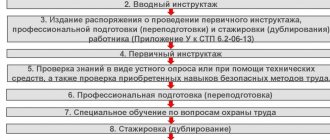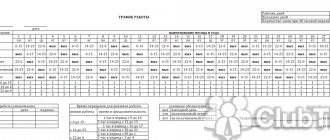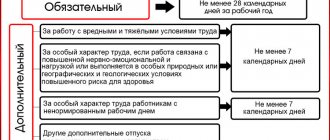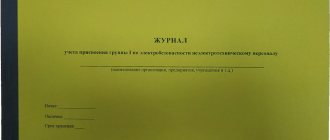Conducting medical examinations - preliminary and periodic - is one of the main responsibilities of the employer, and a major cost item for labor protection.
The fine for lack of a medical examination is also one of the largest. In this article we will tell you how to properly organize this event, what documents to prepare, and in what case you need to fire an employee or refuse a candidate for a position if there are medical contraindications. Article navigation
- For whom medical examinations are required?
- How to organize a preliminary medical examination
- Referral for preliminary medical examination
- How to organize a periodic medical examination
- What changes in the procedure for conducting medical examinations does the Ministry of Health promise in 2021?
Useful materials
Sample referral for preliminary medical examination
Sample order for periodic medical examination
Sample of a reasoned refusal to hire due to identified medical contraindications
For whom medical examinations are required?
Conducting preliminary and periodic medical examinations of workers is regulated by Order No. 302n of the Ministry of Health and Social Development of Russia dated April 12, 2011 (as amended on December 13, 2019).
This order approved lists of harmful and dangerous production factors, as well as work that requires medical examinations of workers (Appendices 1 and 2). This order also has Appendix 3 - the procedure for conducting medical examinations. The order was registered with the Ministry of Justice of Russia on October 21, 2011 under No. 22111, so its implementation is mandatory for all employers.
Attention! Some employers and inexperienced labor protection specialists may be confused by the first paragraph of Article 213 of the Labor Code of the Russian Federation. A literal reading of this norm states that a medical examination is mandatory for workers in hazardous working conditions and certain categories operating vehicles.
Thus, from Article 213 of the Labor Code of the Russian Federation it follows that a medical examination is mandatory for drivers of all vehicles, as well as for all those working in harmful and dangerous working conditions. Therefore, if an employee has acceptable working conditions of class 2, then a medical examination may not be carried out, but this contradicts order No. 302n if he performs work according to list No. 2.
Examples:
№1. An electrician works for the organization. His working conditions are acceptable. But a medical examination is mandatory for him, since the list of works includes maintenance of electrical installations (clause 2 in Appendix 2 to Order 302n).
№2. Accountant-economist in a trade organization. His working conditions are also not harmful or dangerous. But he works in trade, even though he is an office worker, but paragraph 15 does not contain any separate clarifications; if the staff carries out work in a trade organization, he undergoes a medical examination every year, regardless of the class of working conditions and contact with goods, such as food, and industrial.
Until the legal conflict between Article 213 of the Labor Code of the Russian Federation and Order No. 302n is eliminated, medical examinations need to be carried out not only for “harmful workers”, but also for workers with acceptable working conditions if they are affected by the factors specified in Appendix 1 or they perform work according to Appendix 2 .
The fine for workers not undergoing a medical examination is multiplicative. This means that it is summed up by the number of workers whose labor rights were violated. Therefore, the inspector may issue a fine from 110,000 to 130,000 rubles , and the court will not consider such an offense on the part of the employee to be insignificant and will not replace it with a warning, since the employer’s actions entail a threat to the life and health of the employee.
It does not matter what specific medical examination was not carried out - preliminary or periodic, the fine will still be set according to the number of persons who did not undergo the mandatory medical examination.
Remember that each enterprise must compile a list of contingents , in which you must indicate all professions or positions of employees that are subject to medical examination.
Advice from an expert: one copy of the list of contingents must be submitted by notification to the territorial department of Rospotrebnadzor at the location of the employer. By notification means that the list is sent by letter to Rospotrebnadzor within ten days after approval by the employer, and there is no need to approve it or confirm receipt in a special way.
Therefore, compose a registered letter with zero cost, attach a postal notification to it, and keep the track code of the postal item or a copy of the receipt. The original receipt will be useful to the accounting department for reimbursement of postage costs.
Frequency
Each organizational structure must annually enter into agreements with specialized institutions to conduct a commission. The frequency of exposure to a particular profession or harmful factor is established based on the requirements of regulatory documents:
- Order of the Ministry of Health 302-N;
- cards for special assessment of working conditions.
The dynamism of health monitoring is established for employees whose activities are associated with hazardous working conditions. Mandatory medical examinations are required for the following categories:
- Working in the field of trade, catering, food industry. When working with food products, inspections are required once every six months. Tests are taken to detect different types of harmful bacteria. A fluorography study is also prescribed, but every year.
- Teachers working in children's institutions are examined four times a year. It is important to determine the presence of helminths and other infections in this population. Timely prevention and treatment will only protect contact with children.
- Employees working in pharmacies are required to undergo an annual medical examination.
- Once every six months, an inspection is required for persons whose activities are related to the maintenance of swimming pools and public utilities. Employees are required to be vaccinated against diphtheria.
How to organize a preliminary medical examination
A preliminary medical examination is carried out at the time of personnel selection. They do this on the direction of the employer and exclusively at the expense of the company.
We remind you that a medical examination is necessary for those who will be employed:
- at work with harmful or dangerous working conditions (Article 213, 330.3 of the Labor Code);
- when working with traffic, including drivers (Articles 213 and 328 of the Labor Code, Article 23 of Law No. 196-FZ of December 10, 1995);
- at enterprises of the food industry, catering and trade, water supply facilities, medical and preventive care and children's institutions (Article 213 of the Labor Code);
- in departmental security (Article 6 of the Law of April 14, 1999 No. 77-FZ).
To know which candidates need to be sent for a medical examination, the occupational safety specialist provides the personnel officer with a list of contingents approved by the head of the organization. If the position for which the candidate is applying is on this list, hiring without a preliminary mandatory medical examination is prohibited.
In the direction for a medical examination, harmful (dangerous) production factors that exist in the candidate’s future workplace are indicated.
What to do after the examination
Let's talk about how the results of periodic medical examinations of the organization's employees are compiled. After employees pass the test, the employer collects signed and certified by the seal of the medical institution reports with the results of the test.
Based on the medical report, the employee’s membership in one of the dispensary groups is determined, followed by indication in the medical card and health passport of recommendations for the prevention of diseases, including occupational diseases. And if there are medical indications - for further observation, treatment and rehabilitation.
Read more: Procedure for conducting medical examinations
Referral for preliminary medical examination
If a candidate does not undergo a medical examination, that is, receives a medical certificate indicating that he is not fit to perform work for a certain position, an employment contract cannot be concluded with him. Such an applicant will receive a reasoned refusal to hire.
Sample of a reasoned refusal to hire due to identified medical contraindications
We remind managers, personnel officers and labor protection specialists. If an organization hires a recently dismissed employee, he must also be sent for a preliminary medical examination. The duration of dismissal does not matter (Article 213 of the Labor Code, letter of the Ministry of Labor dated April 28, 2017 No. 15-2/OOG-1224).
Remember that the cost of the preliminary medical examination is borne by the employer, not the applicant. In the referral for a medical examination, be sure to indicate the details of the medical organization to which you are sending the applicant.
Many people ask whether it is necessary to send office workers for a preliminary and then periodic medical examination. Let's answer this: if office workers work at a computer at least 50% of their working time, they must undergo medical examinations without fail.
Algorithm
The administration of the enterprise is obliged to organize a medical examination at its own expense and at the same time exclude paid examinations.
The medical examination is organized in the following sequence:
- Preparing a list of people who need to be examined by doctors. 10 days before the start of the event, the prepared list should be sent to Rospotrebnadzor.
- Choosing an organization to host the event. The medical institution must have all unexpired permits.
- Concluding contractual relations with the selected structure. This also includes the timing of the event.
- Publication of an administrative document on the event. Familiarization with the document of all employees for signature. It is important here not to miss anyone, so that questions about non-notification do not arise.
- The organization of issuing referrals for examination is also carried out against signature.
- The event can be held on the territory of the organization or in a medical facility. The first option is possible if there is a first-aid post.
Watch a seminar on conducting medical examinations:
How to organize a periodic medical examination
Employees who have previously undergone a preliminary medical examination are sent for periodic medical examinations. We must also not forget that in addition to Order No. 302n, there are also industry documents that also regulate the procedure for conducting medical examinations (Article 213 of the Labor Code and Article 24 of the Law of November 21, 2011 No. 323-FZ).
For example, employees employed in public railway transport (Order of the Ministry of Transport dated July 16, 2010 No. 154) or in construction (clause 13.1 of SanPiN 2.2.3.1384-03) must be sent for mandatory medical examinations.
Employees under the age of 18, as well as professional athletes, also undergo mandatory medical examinations (Articles 69, 266, 348.3 of the Labor Code).
If the period for undergoing a mandatory medical examination is once every 2 years, then after the preliminary medical examination is completed by the employee, the next medical examination is periodic and will take place no later than two years.
Example:
The employee underwent a preliminary medical examination on June 1, 2021. The frequency of medical examination is at least once a year. Therefore, the periodic medical examination must be completed, and the conclusion must be issued no later than the same date next year - 2021. Thus, starting from June 2, 2021, the employer has the right to be fined under Part 3 of Article 5.27.1 of the Code of Administrative Offenses of the Russian Federation. Therefore, do not take risks and conduct a medical examination with a reasonable amount of time.
The medical examination procedure differs only in documentation. Unlike a preliminary medical examination, the employee must be familiarized with the medical examination schedule in writing - no later than ten days from the planned date of the medical examination .
The employee receives a referral for a medical examination. It is issued by the personnel officer, because this document contains personal information. After the medical examination, the employee must show the HR officer the conclusion. If there are no contraindications, then the employee is allowed to work, and the employer is not required to draw up a separate order for admission. If there are contraindications, the employee will have to be removed from work and offered available vacancies; if there are no vacancies, he will have to be fired. This is also the responsibility of the personnel officer, not the occupational safety specialist.
Order to conduct periodic medical examination
While the employee undergoes a medical examination, his position and average salary are retained, and even if additional examinations are required, all expenses for the medical examination will be borne by the employer.
After all employees have undergone a periodic medical examination, the employer will receive its own copy of the final report. Then the employer and the medical organization will sign an acceptance certificate for the work performed under the contract for the provision of medical examination services. After this, the contract is considered fulfilled and the medical examination is passed.
List of mandatory examinations
Since 2021, during periodic medical examinations, all subjects are required to undergo the following manipulations:
| Action | Explanation |
| Questioning of employees aged 18 years and older | This is done for the purposes of:
|
| Calculation based on anthropometry of body mass index for citizens aged 18 years and older | This is a measurement of height, body weight, waist circumference |
| Clinical blood test | For hemoglobin, color indicator, red blood cells, platelets, leukocytes, leukocyte formula, ESR |
| Clinical urine analysis | Specific gravity, protein, sugar, sediment microscopy |
| Electrocardiography at rest | For persons 18 years and older |
| Blood pressure measurement in peripheral arteries | For persons 18 years and older |
| Determining the level of total cholesterol in the blood for citizens 18 years of age and older | It is acceptable to use the express method |
| Testing fasting blood glucose levels for citizens 18 years of age and older | It is acceptable to use the express method |
| Determination of relative cardiovascular risk in citizens aged 18 to 40 years inclusive | According to the SCORE cardiovascular risk scale. At the same time, in those with cardiovascular diseases of atherosclerotic origin, type 2 diabetes mellitus and chronic kidney disease, the level of absolute cardiovascular risk according to the SCORE risk scale is not determined and is regarded as very high, regardless of the scale indicators |
| Determination of absolute cardiovascular risk | For citizens over 40 years of age |
| Fluorography or radiography of the lungs in 2 projections (direct and right lateral) for citizens aged 18 years and older | Not carried out if the citizen underwent fluorography, radiography (fluoroscopy) or computed tomography of the chest organs during the previous calendar year |
| Measuring intraocular pressure | From age 40 |
What changes in the procedure for conducting medical examinations does the Ministry of Health promise in 2021?
The Ministry of Health has prepared amendments to order No. 302n . It is unknown when they will be accepted. The bill is currently undergoing an independent anti-corruption review. The project entails major changes in the procedure for conducting medical examinations:
- The health passport may be cancelled, and the conclusion will indicate all the harmful factors that are contraindicated for the employee, as well as his health group. What is positive for the employer in the new project: he will be able to receive his own copy of the medical report, and not wait for the employee to provide him with this information upon request. This will make it easier and faster to remove an employee.
- The employer will be able to send an employee for a medical examination after long-term disability; currently he does not have such a right, and many employees abuse it.
- Clinics, with the permission of the employee, will transfer information about their health status to the Social Insurance Fund. It is also planned to take into account the results of the employee’s medical examination when conducting mandatory medical examinations. This is necessary to reduce the burden on medical commissions. However, whether this will affect the cost of medical examinations is unknown.
- A new term will appear for shift workers - mobile medical code . If the bill is passed, it will officially be allowed to conduct medical examinations on the road as part of a mobile team. This is not yet permitted, since medical services can only be provided at the address in the license. Time will tell how this will be implemented once the bill comes into force.
2
0
How do you pay
In order for the medical examination to be completed, it is necessary to pay for all procedures. Who pays for the event? If a citizen gets a job or undergoes periodic health checks, then all expenses fall on the shoulders of the employer.
To avoid any doubts, you can read Article 213 of the Labor Code of the Russian Federation. The organizational structure itself enters into an agreement with the medical institution and pays the funds due to it.
But before entering into agreements, you need to check:
- availability of a license;
- list of services (the right to hold an event, conduct an examination of the professional suitability of employees);
- availability of specialists on staff;
- equipping with appropriate equipment;
- provision of services at the location specified in the licensing requirements.
The procedure for examination by a psychiatrist and narcologist should also be taken care of in advance. The cost of services is determined based on the number of doctors and the number of laboratory test results.
Who should undergo medical examinations in the organization
Who is required to undergo preliminary medical examinations?
Who should undergo medical examinations in an organization is determined by a number of regulations, depending on the type of work and field of activity:
- employees exposed to harmful and dangerous factors, or performing work specified in the list;
- when performing work related to the transport sector (primarily drivers);
- participants in underground work;
- food industry and catering workers;
- employees of the trade industry (regardless of the product category);
- those employed in the medical field and education (including preschool and additional education);
- athletes;
- adolescents (under 18 years of age).
But the frequency of medical examinations for these professions differs.
Medical examination at work: legislation
The employer’s obligation to organize the training of employees of the Ministry of Defense is regulated by a number of legal acts:
- Labor Code of the Russian Federation.
- Order of the Ministry of Social Development No. 302n dated April 12, 2011 (as amended on February 6, 2018).
- Resolution of the Supreme Court of the Russian Federation dated December 6, 2017 No. 34-AD17-5.
- Federal Law No. 52-FZ “On the sanitary and epidemiological welfare of the population” (as amended on August 3, 2018).
Carrying out MO at an enterprise is a rather complicated procedure. But violation of its requirements may result in penalties for the employer. Some production processes are permissible provided that certain worker health criteria are met. In addition, MO makes it possible to identify pathological abnormalities and the occurrence of occupational diseases at an early stage. This is extremely important for prescribing timely treatment. If the manager refuses to undergo medical training, he has the right to remove the employee from performing his duties.










